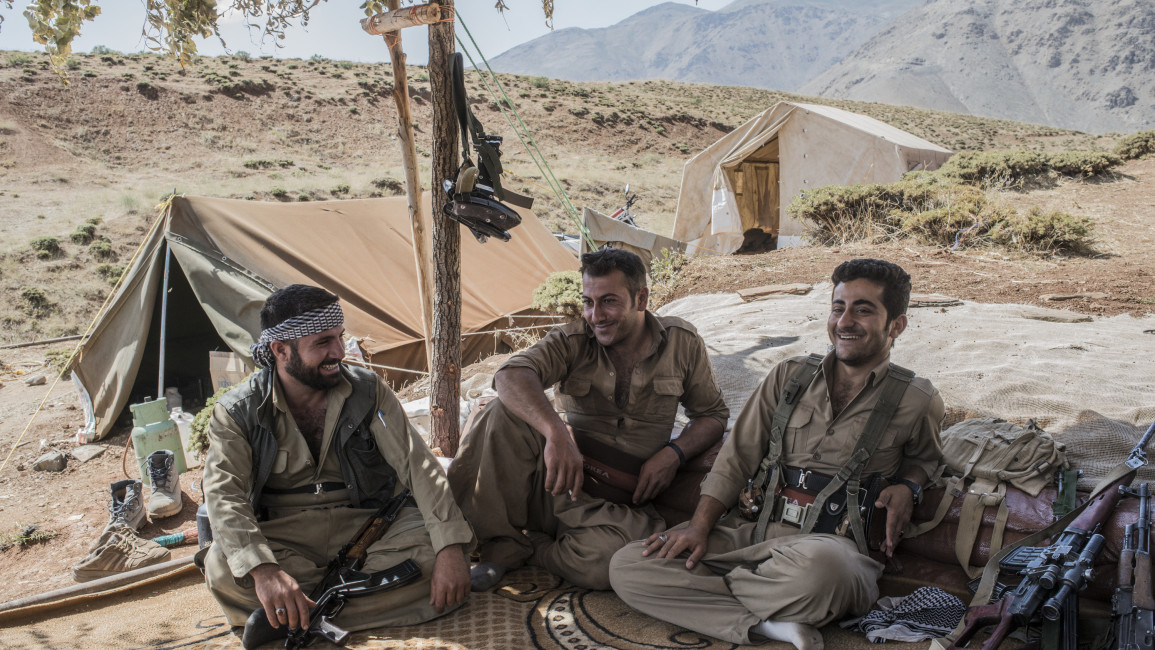Iran shells Kurdish opposition groups in northern Iraq
Iran continues its shelling of border areas of the Iraqi Kurdistan region (IKR) to pressure Iranian Kurdish opposition parties in the region from supporting ongoing protests in Kurdish-populated cities in western Iran, Kurdish officials said.
Protests have spread across Kurdish cities within the Iranian Kurdistan region after the death of Mahsa (Zhina) Amini, a 22-year-old Kurdish woman from the city of Saqez. Amini died in police custody following her arrest on 16 September in Tehran for "unsuitable attire" by the morality police that enforces the Islamic Republic's strict dress code.
"For the fourth successive day, the Islamic Republic of Iran has been heavily shelling eastern and southern border areas of the Iraqi Kurdistan region in Choman and Shitakan, on pretexts of the existence of military bases of the Iranian Kurdish opposition political parties," said Kawa Bahrami, commander of the Kurdistan Peshmerga Forces of the Kurdistan Democratic Party of Iran (KDPI), to The New Arab in a phone interview.
"Iran's assaults on the border areas also included fighter jets, drone attacks and missiles. Fortunately, so far there are no casualties among our forces or civilians. However, there is damage to the environment, and villagers are forced to evacuate their homes and lands," Bahrami added.
ئەمڕۆی گوندەکەم 💔 لەدوای ساڵی 2017 کە ناچار گوندەکەمان چۆڵکرد ، بۆ یەکەمجارە بۆردومانی هێندە سەخت بکرێینەوە. ئێستا خەریکی دروستکردنی خانوی مامۆستاکانی ئەو منداڵانەین کە ڕادەکەن و دەگرین بۆ ئەوەی گوند چۆڵنەبێ ،بۆ ئەوەی منداڵەکان بێ خوێندن نەبن . pic.twitter.com/rsUORHLsAL
— Rezhna Dehaty (@RezhnaDehaty) September 26, 2022
He noted although Iranian Kurds embraced the request by the Iranian Kurdish political parties to stage civilian boycotts and demonstrations in Iran, but their peshmerga forces have not interfered militarily in the "civilian" protests that have swept across the Kurdish-populated cities in western Iran, better known as Rojhalat.
"By shelling the border areas, Iran wants to portray that there are foreign agendas behind the protests in the country and that the Iranian Kurdish political parties based in IKR are related to Israel and the United States or other to foreign countries. Tehran wants to mislead the international community on the civil and natural protests in Iran," he stressed.
Furthermore, Bahrami indicated that their peshmerga forces do not have bases in the border areas and if Iran's message was to force them to withdraw from the mountainous border areas, "it cannot achieve that goal."
On Monday, Iranian shelling targeted the Sidakan area of Erbil province.
Video clips posted by Kurdish social media users show Kurdish villages being heavily shelled, with children and women crying and running in panic.
L'Iran frappe la région de Choman, au Kurdistan d'Irak, où il y aurait ds groupes armés du Rojhilat (Kurdistan d'Iran).#MahsaAmini #JinaMashaAmini #TwitterKurds #EndIranRegime #IranProtests2022 #JinaAmini https://t.co/cE6yLfma0P
— Kurdistan au féminin (@KurdistanAu) September 27, 2022
Ihsan Chalabi, Sidakan mayor, told TNA that the Iranian artillery has been shelling border areas for the fourth successive day, although there are no bases of Iranian Kurdish parties in the areas. "There were no casualties, but locals and farmers fled in fear for their lives, and in some villages, schools were shut down," Chalabi said.
He pointed out that they addressed their peers in the interior ministry of the Kurdistan Regional Government (KRG) which is expected to call on the Iranian side to cease the bombing.
On his part, Hassan Qadirzadeh, an official within the KDPI, told TNA that Iran, through the Kurdish ruling parties in the IKR, has delivered a warning to all the Iranian Kurdish parties to evacuate the border areas.
"The IRGC artillery and drone units have employed smart and precision-strike weapons to hit the gathering bases as well as the training and operational centres of the terrorist groups stationed in the Iraqi Kurdistan Region…after terrorists' move to ignite riots and unrest along border cities west of Iran," Tasnim news agency, affiliated with Iran's Revolutionary Guard Corps (IRGC) reported on Monday.
In a stern warning of launching fresh ballistic missile attacks against the headquarters of the Iranian Kurdish parties, the IRGC cautioned civilians in the IKR to avoid approaching those sites.
Qadirzadeh said that they can maintain their security and hoped that possible missile attacks would not lead to any casualties.
The KDPI is an Iranian Kurdish opposition party that has waged an armed rebellion against the Iranian government since the 1979 Islamic revolution. The group was banned after Iran's 1979 Islamic revolution.
In September 2018, an Iranian missile strike on the KDPI headquarters in Iraq's Kurdish region killed 15 people.
Kurds, a non-Arab ethnic group, have long agitated for their state. They number between 25 million and 35 million people and spread across Turkey, Syria, Iraq and Iran. In Iran, they make up around 10 per cent of the population.
Tehran has warned the authorities in Iraqi Kurdistan not to allow Iranian Kurds to set up camps near the border and to disarm the Iranian Kurdish opposition parties.



